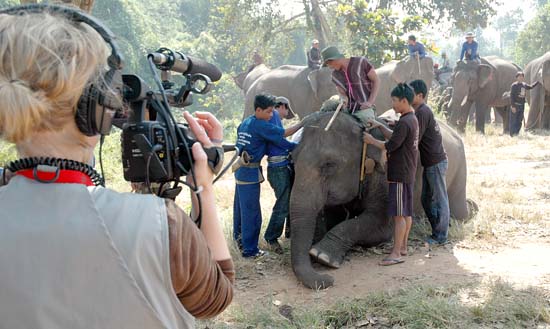Today, environmentalists will come out with the latest method of encouraging Los Angeles to go green. At the Green Screen Environmental Film Festival & Salon at the Electric Lodge in Venice Beach, conservationists will show visitors just how much damage is being done to the Earth daily.
This festival, first held in 2007, continues this year in an effort to encourage sustainability through performances, films and a street-fair atmosphere.
“It is part of our Eco-stage Initiatives at the Lodge, which is a triad of programs focused on our one and only life-sustaining environment,” said Joel Shapiro, Electric Lodge founder and artistic director. “This is an activist festival. I want people to feel excited, to leave here inspired.”
The festival runs until Nov. 22 and will feature 24 films with topics ranging from the plight of Thai elephants to a refinery in Carson to ecological threats of the Ganges River. There will also be a street fair and a sustainable drive-in movie. Holding the event will be the Electric Lodge, a performing and visual arts center with a focus on being an environmentally sound and creative resource.
The festival attempts to bridge the arts with environmental consciousness. While music and film festivals often end with wasted gas, thousands of empty water bottles and trash, this festival aims to educate the public about the day-to-day issues that are facing the world. Live performances, crafts and food will also help promote an eco-friendly lifestyle. Performances will include singer-songwriter Tom Freund with songs such as “Hug Trees,” accompanied by kid-friendly projects and organic food provided by the Green Truck and Whole Foods. The festival is encouraging as much consciousness as possible, starting with the screen itself.
“We are one of the first solar-powered visual and performing arts centers in the United States and have always aimed to be sustainable within the Lodge through energy efficiency, recycling, etc. The film festival is a natural outreach to our vibrant film community in Venice and greater Los Angeles,” Shapiro said.
According to environmental studies and geography professor Yongkang Xue, Los Angeles still has a lot of work to do, environmentally speaking. Xue is at issue with much of the daily activities in the city, but sees driving as the hugest threat.
“In my opinion, the greenhouse emissions caused by cars are the No. 1 issue,” Xue said. “No. 2 would be land use and climate change and their impact on the world. But then there are many other great issues ““ for instance, pollution. The pollution affects us in many parts; our fish have a very high metal concentration, and health concerns arise.”
In an effort to decrease greenhouse emissions and pollution, the festival is encouraging all participants to bicycle, take public transportation, walk or carpool to the event.
“As a big institution, we have to find some ways to save paper. We try to use digital documents instead of paper, but I always feel that people throw away a lot of paper and thus waste a lot of resources, creating more junk. And this junk leads to pollution,” Xue said. “I see all our resources as limited at this point, and the population is certainly increasing.”
CALPIRG member Coreen Weintraub agrees that, like most universities, UCLA needs to continue thinking green. “Universities like UCLA use so much energy, and if that energy is coming from gas and coal and such, that would be a huge impact on our environment. So if we were using more solar and green power, it would be a huge step the university could take.”
Weintraub said she sees many ways UCLA can further its sustainability.
Steps toward creating a more-green environment support the festival’s ideologies.
“The whole idea is to engage with our environment and ask questions about where we are, what we are doing and where we want to be so that we will go out and take the next step, be involved,” Shapiro said.
